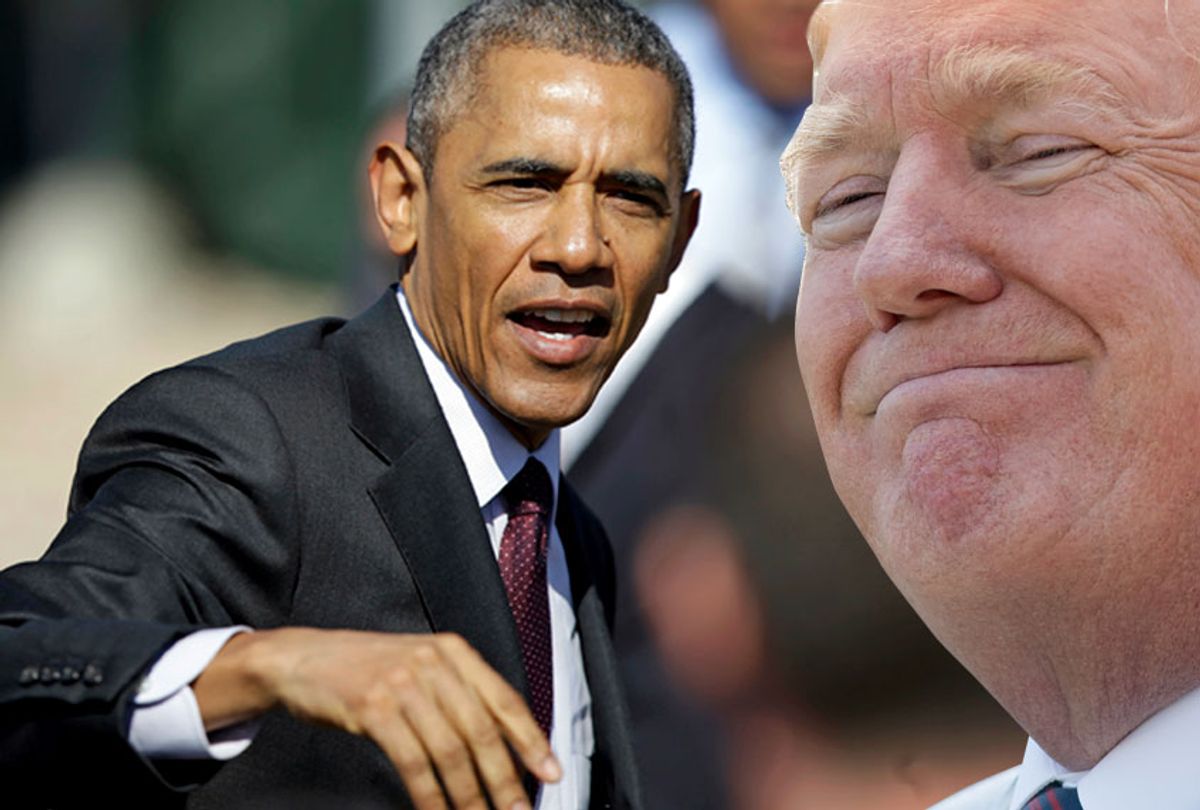President Donald Trump is not expected to unveil former President Barack Obama's portrait at the White House, breaking with decades of tradition as he pushes a baseless conspiracy theory against his two-term predecessor.
Presidents of both parties have briefly eschewed partisanship to honor the men whom they replaced.
"We may have our differences politically," Obama said of former President George W. Bush at his portrait unveiling in 2012, "but the presidency transcends those differences."
Not anymore, apparently.
Trump is not expected to keep the tradition alive, sources told NBC News, as he alleges that Obama committed some sort of unspecified crime and complains that Attorney General William Barr will not investigate him and his former Vice President Joe Biden, now the presumptive Democratic presidential nominee.
Obama likewise has "no interest" in participating in any ceremony as long as Trump is in office, sources told NBC.
"You've got a president who's talking about putting the previous one in legal jeopardy — to put it nicely. We have not seen a situation like that in history," presidential historian Michael Beschloss told the outlet. "It takes antipathy of a new president for a predecessor to a new level."
The bipartisan tradition goes back to former President Jimmy Carter, who welcomed former President Gerald Ford to the White House after defeating him four years earlier. Carter himself did not attend a ceremony for his White House portrait when former President Ronald Reagan was in office. Every president since has carried on the tradition.
"It's a statement of generosity on [the part of] the current president and first lady," former White House curator Betty Monkman said of the tradition. "And it's a very warm, lovely moment."
But Trump's relationship with Obama has been fraught for years, to say the least. Trump spent years pushing a racist conspiracy theory alleging that Obama was not born in the U.S. Obama responded to Trump's unrelenting attacks by brutally mocking him to his face at the 2011 White House Correspondents' Dinner, which led him to run for president, according to some confidants.
Obama stayed largely quiet during Trump's first three years in office, but he has become increasingly vocal in the wake of his formal endorsement of Biden's bid. Obama recently lit into the Trump administration for intervening in former national security adviser Michael Flynn's criminal case and strongly criticized Trump's coronavirus response in leaked comments he made to former administration aides.
"What we're fighting against is these long-term trends in which being selfish, being tribal, being divided and seeing others as an enemy — that has become a stronger impulse in American life," Obama said in the recording. "And by the way, we're seeing that internationally, as well. It's part of the reason why the response to this global crisis has been so anemic and spotty. It would have been bad even with the best of governments. It has been an absolute chaotic disaster when that mindset — of 'what's in it for me' and 'to heck with everybody else' — when that mindset is operationalized in our government."
Trump responded by assailing Obama and accusing him of an unspecified crime, repeatedly tweeting the phrase "Obamagate." But Trump had no response when asked what crime he though Obama had committed. He later expressed "surprised" when Barr revealed that the Justice Department's review of the Russia probe was not expected to result in investigations of Obama and Biden.
The facts have not stopped Trump from alleging that Obama's administration was "one of the most corrupt and incompetent in U.S. history." Obama has continued to dig at Trump, most recently calling out his pandemic response in a virtual commencement speech last weekend without mentioning his successor by name.
"This pandemic as fully, finally, torn back the curtain on the idea that so many of the folks in charge know what they're doing. A lot of them aren't even pretending to be in charge," Obama said. "…And on the big unfinished goals in this country, like economic and environmental justice and health care for everybody, broad majorities agree on the ends. That's why folks with power will keep trying to divide you over the means. Because that's how nothing changes. You get a system that looks out for the rich and powerful and nobody else."



Shares